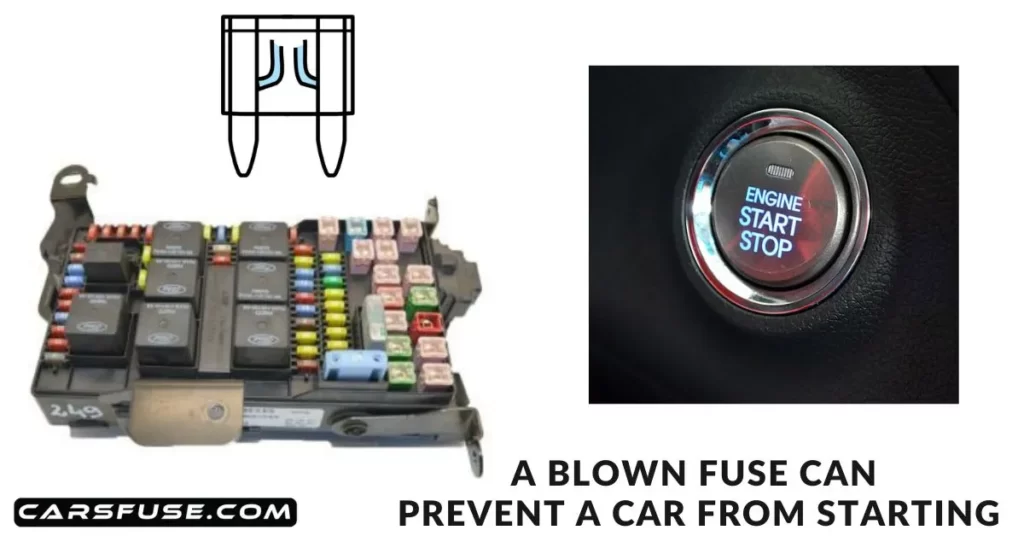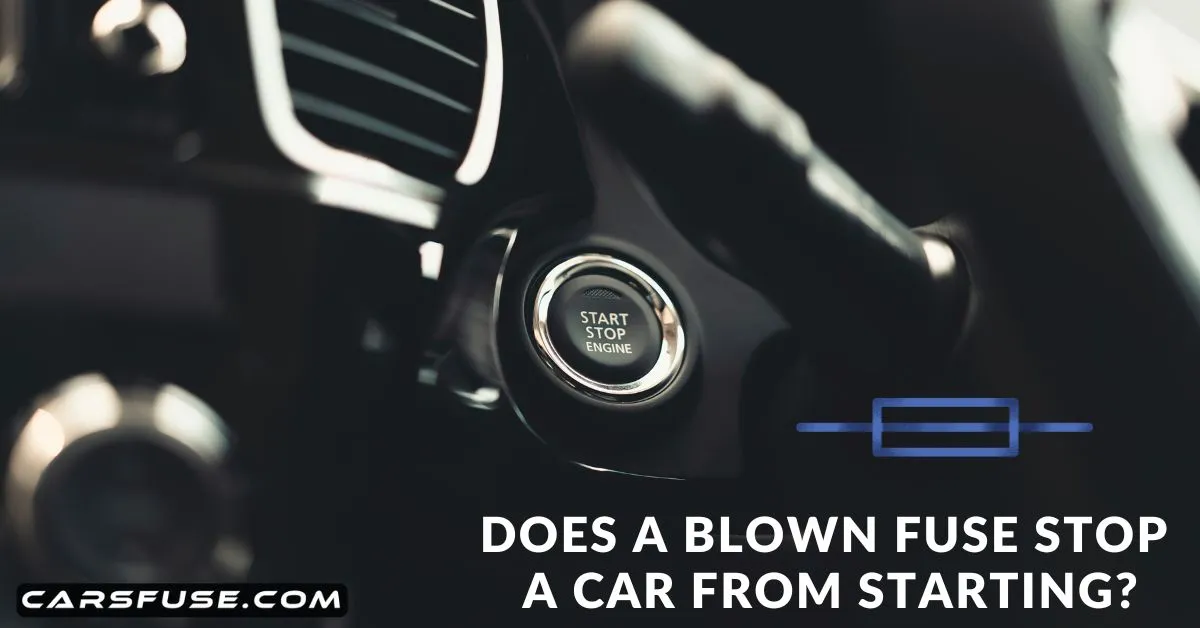Have you ever experienced a situation where your car refuses to start? Well, there might be lots of reasons for a car not starting however, one potential fault could be a blown fuse.
In this blog, we will answer the question ‘Can a blown fuse stop a car from starting?’. We will also explore the role of fuses in the vehicle’s electrical system, signs of a blown fuse, and the potential impact it can have on starting your car.
Without further ado, let’s get started.
Table of Contents
Basic Understanding of Fuses in a Car
Fuses play a vital role in a car’s electrical system as they safeguard different circuits from harm caused by electrical overloads. These crucial safety devices act as a protective barrier between the electrical components and potential damage.
Comprised of a thin strip of metal, fuses are designed to melt or break when an excessive amount of current passes through them. This reaction effectively interrupts the circuit, preventing further damage and ensuring the safety of the electrical system.
Now, let’s explore the symptoms of a blown fuse.
Symptoms of a Blown Fuse
A problem in the Ignition System
The vehicle’s ignition system depends on several electrical components including ignition coils, spark plugs, and the ignition switch.
If a fuse deployed for powering any of the electrical components blows, it can result in a no-start condition.
No Power to the starter motor
When a fuse associated with the starter motor circuit blows, it cuts off the power supply resulting in no power to the motor.
Due to this situation, the starter key may not produce any response from the starter motor.
Electrical Components not working
Components like headlights, interior lights, dashboard lights, signal lights, and other electrical functions may not be working in our car.
If a fuse associated with these components blows or malfunctions, your vehicle may experience problems. That’s why lighting-related issues are often a clear indication of faulty fuses.
Other important reasons for a blown fuse include malfunctioning power widows, inoperative radio or audio system, faulty air conditioning, and so on.
Now, it’s time to find out if a blown fuse can stop a car from starting.
Can a Blown Fuse Prevent a Car from Starting?

A blown fuse can prevent a car from starting if the fuse is associated with the fuel pump, fuel injectors, starter motor, ignition, or other vital electrical components.
It may be surprising but a blown fuse can indeed prevent a car from starting.
Let’s take the example of the 2023 Ford F450.
This heavy-duty pickup truck features two fuse boxes: one in the engine compartment (Under Hood Fuse Box), and the other in the passenger compartment (Interior Fuse Box).

The Under Hood Fuse Box features high-current fuses associated with critical components like vehicle power, electronic power assist steering, powertrain control module, vehicle batter, and others.
For instance, if a 10 amp. fuse for the Powertrain Control Module (PCM) blows, or malfunctions, it might result in the following issues:
- Your car won’t start or struggles to start.
- The engine stalls, or stutters.
- You receive a PCM-related warning.
Likewise, if the 30 amp. fuse for the starter motor blows, it may prevent your Ford F450 from starting.
The proper functioning of the car’s engine relies on crucial components like the ignition system and the fuel pump.
In the case of a blown fuse affecting the ignition system, power may be disrupted, resulting in a failure to reach essential elements such as ignition coils, spark plugs, or the ignition switch. Consequently, the generation of sparks necessary for combustion could be hindered.
Likewise, if the fuse responsible for the fuel pump circuit experiences a blowout, the fuel pump will be deprived of the power required to supply fuel to the engine. Devoid of fuel, the engine will fail to start, leading to an inability to initiate the combustion process.
Some misconceptions about the relationship between fuses, and starting a car
People assume that a blown fuse only affects non-engine components like lights or power windows. However, as discussed above, blown fuses associated with engine components like ignition, starter motor, fuel pump, and spark plugs can prevent the engine from starting.
It is also understood that a blown fuse will always result in a complete power loss. But, a blown fuse may only affect specific electric circuits leading to a partial loss of electrical functions. So, it is crucial to consider a blown fuse as a potential cause when troubleshooting a no-start condition.
Conclusion on ‘Can a blown fuse stop a car from starting?’
As we come to the end of this blog, we discover the relationship between blown fuses and a car’s starting capabilities.
A blown fuse can stop your car from starting if it is associated with vital components of the engine including a fuel pump, starter motor, ignition switch, spark plugs, and so on.
We looked at the 2023 Ford F450 fuse box, and found out that if the Power Control Module (PCM) or start motor fuse blows, it may prevent the vehicle from starting.
So, it is always a best practice to check and maintain fuses in your car. Minor fuse replacement can be done by yourself with basic knowledge of the fuse box, and its diagram. However, complex issues may require expertise from professional mechanics.
Tom Smith is a passionate car mechanic and automotive enthusiast, specializing in the intricate world of car fuse boxes. With years of hands-on experience under the hood, he has earned a reputation as a reliable expert in his field. As the founder and content creator of the popular blog website 'carsfuse.com,' Tom has dedicated himself to sharing his extensive knowledge of car fuse boxes and electrical systems with the world.


